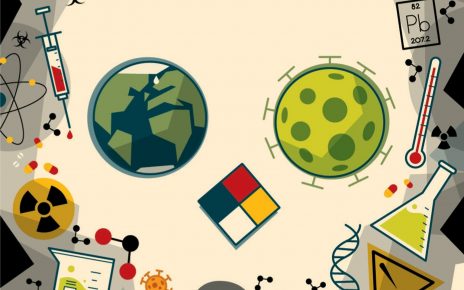My girlfriend, “Emily,” is always telling me I have to read this or watch that. I usually resist. I have my own obsessions to indulge, like quantum mechanics. What’s annoying is that her recommendations, when I grudgingly comply with them, often turn out to be sound.
This happened with two of Emily’s recent picks. One is The Social Dilemma, a documentary on Netflix. It sounded boring—another expose of the perils of social media. Ho hum, old news. But the film gripped me. It’s an in-depth look at how big tech companies, by amassing more and more data on us, are getting better and better at manipulating us, with devastating results.
The film has several strands. One envisions, with actors, how social media hurt an American family. A teenage girl, stung by a casual online remark about her ears, sinks into depression, while her older brother tumbles into the rabbit hole of conspiracy theories. The film also depicts evil AI algorithms, played by three versions of a single creepy actor, ensuring that the teenage boy remains addicted to his smartphone.
These dramatizations were a little hokey. The most compelling, and disturbing, component of the documentary consists of interviews with tech insiders worried about what they have wrought. Actually, “worried” is too bland a word. These veterans of Google, Facebook, Twitter and other companies are freaking out. Some think digital technologies, unregulated, might destroy civilization.
Google, et. al. equip legions of brilliant engineers with vast databases and powerful AI programs to make their products as addictive as possible—that is, to maximize the time we spend staring at a screen. The designers of these devices find them irresistible, too. Tim Kendall, former head of monetization for Facebook, recalls that after spending all day trying to boost his firm’s profits, he went home to his wife and kids and could not stay off his phone. “Knowing what was going on behind the curtain, I still wasn’t able to control my usage.”
The more time we spend on our screens, the more the companies learn about us, the more money they make from advertising—commercial and political—tailored to our fears and desires. And once they deduce what news and (mis)information we like, or might like, online sites feed us more of it, confirming our biases. If you begin a search on, say, climate change, Google may suggest different results depending on what it knows about you and others where you live, according to a former Google designer.
This data-driven pandering not only keeps us glued to our devices. It has also contributed to the proliferation of fake news and conspiracy theories and to social schisms in the U.S. and elsewhere. We end up living in parallel universes with radically different views of global warming, race, gender, immigration, crime, abortion and COVID-19.
Some techies believed, initially, that they were creating a better world. “Our entire motivation was ‘Can we spread positivity and love in the world?’,” says Justin Rosenstein, who helped design Facebook’s “like” button. The possibility that “teens would be getting depressed when they don’t have enough likes, or it could be leading to political polarization, was nowhere on our radar.”
Yes, digital technologies yield vast benefits. During the pandemic I keep in touch with friends and family via e-mail and Zoom, and I teach my classes online. I can do research for this article—rewatching Social Dilemma and looking up reviews on my laptop—right here in my apartment. When I tire of brooding over the downside of tech, I can binge on Community and Arrested Development.
“Our digital era is a blend of “utopia and dystopia,” says Tristan Harris, who left Google to cofound The Center for Humane Technology (a phrase that sounds increasingly oxymoronic). “I can hit a button on my phone and a car shows up in 30 seconds and I can go exactly where I need to go. That is magic.” But Harris fears tech’s ill effects are outweighing its benefits. “If we don’t agree on truth,” he says, “or even that there is such a thing as truth, we’re toast.”
One pundit insists that newspapers, radio and television didn’t destroy civilization, and neither will smart phones. Another retorts that smart phones are far more addictive than previous information technologies. When many of us wake up in the morning, he notes, the only question is whether we check our phones before we pee or while we pee. And modern methods of surveillance and persuasion make those employed in the predigital era look laughably crude.
Toward the end of the film, Social Dilemma identifies capitalism as the ultimate cause of the ills wrought by big tech. Rosenstein, the Facebook designer, notes that capitalism promotes “short-term thinking based on this religion of profit at all costs.” This approach, which views nature as something to be mined, literally and metaphorically, for monetary gain, has given us climate change and other environmental threats.
The successful big-tech firms have figured out how to mine our attention. “We’re more profitable to a corporation,” Rosenstein says, “if we’re staring at a screen, staring at an ad, then if we’re spending our time living our life in a rich way.” Rosenstein and others say the government must regulate tech firms to limit the harm they do; the companies cannot be trusted to regulate themselves.
Shoshana Zuboff, a psychologist at Harvard Business School, contends that companies should not be free to gather and sell information on customers without their consent. “These markets undermine democracy and they undermine freedom, and they should be outlawed,” she says. “This is not a radical proposal. There are other markets that we outlaw. We outlaw markets in human organs. We outlaw markets in human slaves.”
These calls for reform bring me to Emily’s other recommendation, an infamous 50-year-old essay, “The Social Responsibility of Business Is to Increase Its Profits,” by economist Milton Friedman. The New York Times, which printed the essay in 1970, just republished it along with commentary from scholars and businessfolk.
The essay had a huge impact on economics as well as business and politics. As the Times puts it, Friedman’s “libertarian economics influenced presidents and inspired ‘greed is good.’” Friedman’s manifesto is crediting with catalyzing the swerve of the U.S. and other western democracies toward free-wheeling capitalism, which governments encouraged with lower taxes.
Friedman rebuked calls for corporations to seek social goals, such as “eliminating discrimination, avoiding pollution and whatever else may be the catchwords of the contemporary crop of reformers.” Those who express support for these goals, Friedman asserted, are “preaching pure and unadulterated socialism” and “undermining the basis of a free society.” Note Friedman’s equation of freedom with corporate freedom.
It is government’s job, Friedman argued, to impose rules on businesses that promote general welfare, but such restrictions should be minimal. By freely pursuing profits in competition with each other, with minimal government interference, businesses produce goods, services and jobs that benefit all of society. So Friedman and his many free-market acolytes have claimed.
We are now reaping the consequences of Friedman’s vision in the form of industries that pursue profits regardless of the social costs. These include big pharma, which foists drugs on us that often make us sicker; big oil, which has thwarted efforts to counteract global warming; and now big tech, which represents the apotheosis of Friedman’s ideology.
Economist and Nobel laureate Joseph Stiglitz comments in the Times that the fallacies of Friedman’s ideology are more obvious than ever. Stiglitz asks: Should Mark Zuckerberg let Facebook users spread “wanton disinformation” if “it increases his bottom line? Friedman would say yes. Economic theory, common sense and historical experience suggest otherwise.”
Friedman’s rhetorical style reminds me of Marx. Both men exude supreme confidence in their judgments, the kind of confidence that inspires zealotry in devotees. Marx predicted that capitalism, by elevating profit above all other values, would inevitably bring about its own destruction. Friedman said capitalism would give us unbounded freedom and prosperity. Right now, Marx is looking more prescient.
Near the end of Social Dilemma, an interviewer asks tech-visionary-turned-critic Jaron Lanier to peer into our future. “If we go down the current status quo,” Lanier replies, “for let’s say another 20 years, we probably destroy our civilization through willful ignorance. We probably fail to meet the challenge of climate change. We probably degrade the world’s democracies, so they fall into some bizarre autocratic dysfunction. We probably ruin the global economy. We probably”—he shrugs—“don’t survive.” Asked what he fears most, Kendall, the former Facebook executive, replies, “In the shortest time horizon? Civil war.”
Give capitalism its due. As I acknowledge in a recent book, capitalism has boosted longevity and prosperity over the last two centuries. But our fanatical commitment to Friedman-style capitalism has burdened us with acute inequality, dysfunctional health care, surging climate change and vicious political polarization. Meanwhile we keep robotically swiping our smart phones as things fall apart.
I try to resist alarmism, as a general rule, but alarmism feels like realism lately.
Oh, and Emily, thanks a lot for those recommendations.
Further Reading:
The Coronavirus and Right-Wing Postmodernism
Does Optimism on Climate Change Make You Pro-Trump?
Did Thomas Kuhn Help Elect Donald Trump?
See also “A Pretty Good Utopia” (profile of economist Deirdre McCloskey in my free online book Mind-Body Problems)




